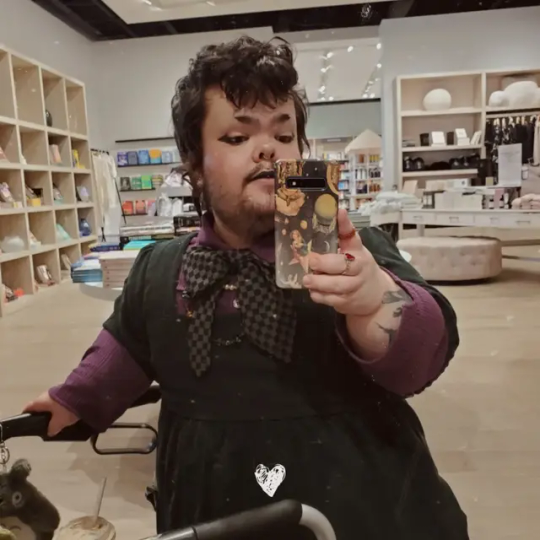#nonbinary blogging
Explore tagged Tumblr posts
Text
softies, romantics and the sentimental be like "i know a spot", and then keep you in their hearts forever
#original post was purely from a heteronormative afab pov#had a bunch of stupid tags in it like:#girlblog#girlblogging#im just a girl#girly things#im girls#this is what makes us girls#and buncha other stupid bio essentialist b.s.#hey dumbass#being sentimental is not a “girl thing”#thats called being human and having a heart and that is not exclusive to your performed gender#get the fuckin memo#dont worry tho#i fixed your crappy heteronormative breeder ahh post#it is now better#youre welcome#nonbinary#nbblogging#nblogging#nonbinary blogging#get ungendered idiot#writing#text post
4 notes
·
View notes
Text

Paris lesbian club, 1934
#lgbtpeople#butch#butch appreciation#lesbian#soft butch#butch positivity#trans masc#masc enby#masc lesbian#lesbian history#femme lesbian#nonbinary lesbian#nb lesbian#butch lesbian#wlw community#wlw post#wlw blog
20K notes
·
View notes
Text
i wanna finger my girl while i’m making out with her just so she struggles to keep kissing back
#wlw nstf#wlnb ns/fw#wlw nsft#sapphic nsft#wlw ns/fw#lesbian nsft#stem lesbian#poc lesbian#fem lesbian#butch lesbian#stud lesbian#masc lesbian#femme lesbian#wlw community#wlw yearning#wlw post#lesbian#wlw blog#wlw concepts#wlw mood#wlw smut#wlw#wlw love#black wlw#sapphic yearning#sapphic love#sapphic#black lesbian#lesbian yearning#nonbinary lesbian
16K notes
·
View notes
Text




Grills will always be gender neutral, my dear.
#lgbt#nonbinary#gender neutral#transgender#fashion#black fashion#unisex#clothing#trans neutral#black culture#black blog#fashion blog#black enby#black community#black tumblr#black is beautiful#black beauty#aesthetic
3K notes
·
View notes
Text
Hi trans lovers
You wanna see what's under my short🥒💦
Telegram: moxiedoll011

#mtf trans#trans beauty#trans community#trans pride#trans woman#transfem#transformers#transgender#transgirl#trans#trans love#transparent#trans positivity#trans rights#transisbeautiful#transsexual#transmasc#lgbtq#lgbt#lgbtqiia+#lgbtq community#trans nstf#trans nfst#nonbinary#gay#gay men#queer#trans content#trans blog#trans boy
3K notes
·
View notes
Text
"my daughter is fine"
no, your daughter isnt fine, nor your daughter. he's your son, and he's not fine either, because he can't tell you he feels this way and he's fucking tired of it.
#lgbtq#lgbtqia#trans#trans pride#transgender#tumblr#nonbinary#trans man#transmasc#my daughter is fine#just venting#vent post#personal vent#vent blog#vent#venting#tw vent
2K notes
·
View notes
Text
Only allowing myself 10 minutes per day on Tiktok, Snapchat, and Insta. Will report back in a week to see if I've mentally improved
Edit: okay 10 minutes was a bit extreme, so I changed it to 1 hour. (I have failed already)
0 notes
Text


I’ve made some things lately
Cis men and minors dni
#chainmail#nonbinary lesbian#lesbian#sapphic nb#sapphic#wlw#wlw post#wlw blog#queer#wlw community#queer community#dykeposting
2K notes
·
View notes
Text

☆ October is Dwarfism Awareness Month!!!! ☆


Elliot (27, they/them) here, I have Achondroplasia dwarfism and run this blog in the hopes to spread some education and awareness on my disability! I am also queer, nonbinary, hard of hearing, and a spoonie! Follow to get to know me and hopefully learn more about my community!!
#please boost#disability blog#dwarfism blog#dwarfism#little people#disabled and queer#cripqueer#nonbinary#queer#dwarfism pride flag#dwarfism awareness month
5K notes
·
View notes
Text
I think we all need a reminder that the word “theyfab” was originally created to hurt nonbinary people, specifically nonbinary people who use they/them and were (assumed to be) AFAB.
The word “theyfab” is exorsexist, first and foremost. It can also be transandrophobic, because some nonbinary people are transmasculine and it does occasionally get used against trans men. However, if you claim theyfab was invented as a slur for trans men first and foremost, you are erasing the experiences of another invisible community.
Trans men are treated terribly on here. But please don't contribute to the erasure of nonbinary people when you're fighting against transandrophobia. We’re in this together, and we need to have each other's backs.
#exorsexism#transandrophobia#this is not directed at anyone in particular! I've seen this happening on several blogs and wanted to make a general statement.#i say nonbinary specific and not “afab specific” bc i've also seen it used indiscriminately against ANY nonbinary person regardless of AGAB#exorsexists see they/them in a profile and start chomping at the bit for an excuse to call us slurs
1K notes
·
View notes
Text
Gendered pronouns in Japanese vs English
In Revolutionary Girl Utena, the main character Utena is a girl (it says so in the title), but very conspicuously uses the masculine first person pronoun 僕 (boku) and dresses in (a variation of) the boys school uniform. Utena's gender, and gender in general, is a core theme of the work. And yet, I haven’t seen a single translation or analysis post where anyone considers using anything other than she/her for Utena when speaking of her in English. This made me wonder: how does one’s choice of pronouns in Japanese correspond to what one’s preferred pronouns would be in English?

There are 3 main differences between gendered pronouns in Japanese vs English
Japanese pronouns are used to refer to yourself (first-person), while English pronouns are used to refer to others (third-person)
The Japanese pronoun you use will differ based on context
Japanese pronouns signify more than just gender
Let’s look at each of these differences in turn and how these differences might lead to a seeming incongruity between one’s Japanese pronoun choice and one’s English pronoun choice (such as the 僕 (boku) vs she/her discrepancy with Utena).
Part 1: First-person vs third-person
While Japanese does technically have gendered third person pronouns (彼、彼女) they are used infrequently¹ and have much less cultural importance placed on them than English third person pronouns. Therefore, I would argue that the cultural equivalent of the gender-signifying third-person pronoun in English is the Japanese first-person pronoun. Much like English “pronouns in bio”, Japanese first-person pronoun choice is considered an expression of identity.
Japanese pronouns are used exclusively to refer to yourself, and therefore a speaker can change the pronoun they’re using for themself on a whim, sometimes mid-conversation, without it being much of an incident. Meanwhile in English, Marquis Bey argues that “Pronouns are like tiny vessels of verification that others are picking up what you are putting down” (2021). By having others use them and externally verify the internal truth of one’s gender, English pronouns, I believe, are seen as more truthful, less frivolous, than Japanese pronouns. They are seen as signifying an objective truth of the referent’s gender; if not objective then at least socially agreed-upon, while Japanese pronouns only signify how the subject feels at this particular moment — purely subjective.
Part 2: Context dependent pronoun use
Japanese speakers often don’t use just one pronoun. As you can see in the below chart, a young man using 俺 (ore) among friends might use 私 (watashi) or 自分 (jibun) when speaking to a teacher. This complicates the idea that these pronouns are gendered, because their gendering depends heavily on context. A man using 私 (watashi) to a teacher is gender-conforming, a man using 私 (watashi) while drinking with friends is gender-non-conforming. Again, this reinforces the relative instability of Japanese pronoun choice, and distances it from gender.

Part 3: Signifying more than gender
English pronouns signify little besides the gender of the antecedent. Because of this, pronouns in English have come to be a shorthand for expressing one’s own gender experience - they reflect an internal gendered truth. However, Japanese pronoun choice doesn’t reflect an “internal truth” of gender. It can signify multiple aspects of your self - gender, sexuality, personality.
For example, 僕 (boku) is used by gay men to communicate that they are bottoms, contrasted with the use of 俺 (ore) by tops. 僕 (boku) may also be used by softer, academic men and boys (in casual contexts - note that many men use 僕 (boku) in more formal contexts) as a personality signifier - maybe to communicate something as simplistic as “I’m not the kind of guy who’s into sports.” 俺 (ore) could be used by a butch lesbian who still strongly identifies as a woman, in order to signify sexuality and an assertive personality. 私 (watashi) may be used by people of all genders to convey professionalism. The list goes on.
I believe this is what’s happening with Utena - she is signifying her rebellion against traditional feminine gender roles with her use of 僕 (boku), but as part of this rebellion, she necessarily must still be a girl. Rather than saying “girls don’t use boku, so I’m not a girl”, her pronoun choice is saying “your conception of femininity is bullshit, girls can use boku too”.

Through translation, gendered assumptions need to be made, sometimes about real people. Remember that he/they, she/her, they/them are purely English linguistic constructs, and don’t correspond directly to one’s gender, just as they don’t correspond directly to the Japanese pronouns one might use. Imagine a scenario where you are translating a news story about a Japanese genderqueer person. The most ethical way to determine what pronouns they would prefer would be to get in contact with them and ask them, right? But what if they don’t speak English? Are you going to have to teach them English, and the nuances of English pronoun choice, before you can translate the piece? That would be ridiculous! It’s simply not a viable option². So you must make a gendered assumption based on all the factors - their Japanese pronoun use (context dependent!), their clothing, the way they present their body, their speech patterns, etc.
If translation is about rewriting the text as if it were originally in the target language, you must also rewrite the gender of those people and characters in the translation. The question you must ask yourself is: How does their gender presentation, which has been tailored to a Japanese-language understanding of gender, correspond to an equivalent English-language understanding of gender? This is an incredibly fraught decision, but nonetheless a necessary one. It’s an unsatisfying dilemma, and one that poignantly exposes the fickle, unstable, culture-dependent nature of gender.

Notes and References
¹ Usually in Japanese, speakers use the person’s name directly to address someone in second or third person
² And has colonialist undertones as a solution if you ask me - “You need to pick English pronouns! You ought to understand your gender through our language!”
Bey, Marquis— 2021 Re: [No Subject]—On Nonbinary Gender
Rose divider taken from this post
#langblr#japanese#japanese language#language#language learning#linguistics#learning japanese#utena#revolutionary girl utena#shojo kakumei utena#rgu#sku#gender#transgender#nonbinary#trans#official blog post#translation#media analysis
3K notes
·
View notes
Text
wanna make a pretty girl hump her pillow and send me videos of how pathetic she is for me
#lesbian#wlw post#masc lesbian#wlw community#wlw yearning#wlw blog#wlw concepts#fem lesbian#poc lesbian#sapphic nsft#lesbian nsft#wlw nstf#wlw ns/fw#wlnb ns/fw#wlw nsft#wlw mood#wlw smut#wlw love#wlw sub#stem lesbian#femme lesbian#stud lesbian#butch lesbian#nonbinary lesbian#lesbian yearning#lesbianism#sapphic yearning#sapphic love#sapphic#wlw
7K notes
·
View notes
Text

knight in shining armor butch x distressed princess femme
#wlw couple#wlw film#wlw movie#wlw yearning#wlw post#wlw blog#femme for butch#butchfemme#butch lesbian#butch dyke#stone butch#butch appreciation#femme#femme4masc#femme lesbian#femme4butch#high femme#non binary#nonbinary#enby#sapphic books#sapphic film#sapphic literature#sapphic#lgbt film#lgbt movies#lgbtq#lgbt#lgbtqia#lgbtq community
996 notes
·
View notes
Text
Happy black history month
🥂 cheers to black lesbians, black femmes, black masc presenting persons, black studs, black non binary persons, black butches, black trans persons 👑, and any black person who exists outside of the above mentioned, and to those who love us.
#wlw blog#wlw post#black queerness#dykeposting#butch appreciation#mine#stud lesbian#transgender#black femme#black women#black nonbinary#black history month 2025
947 notes
·
View notes
Text
I don't know why people are so negative. Like isn't that the last thing that we need in this world?
0 notes
Text
DNI if you:
are man or woman
are human or beast
dwell indoors or outdoors
browse clothed or unclothed
post by day or by night
reblog on land or at sea
#tumblr#blogging#social media#dni#folklore#mythology#nonbinary catgirl posting from a treehouse at twilight:
10K notes
·
View notes